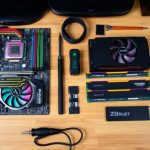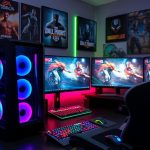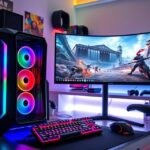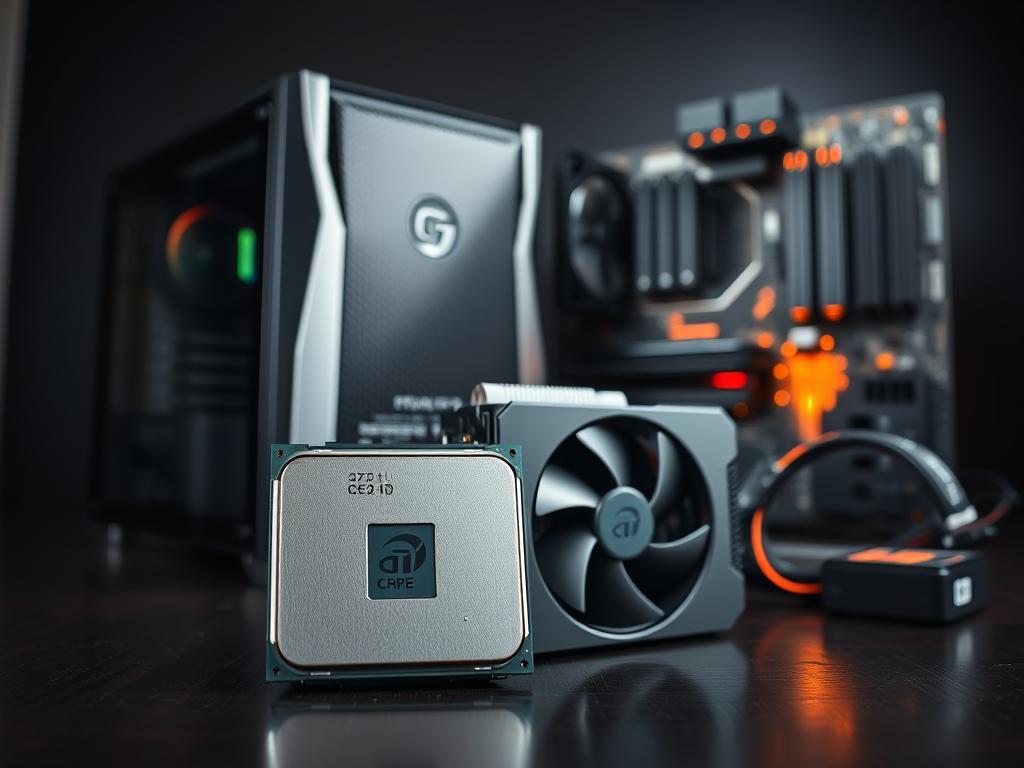Building a gaming PC doesnt have to drain your wallet.
Clever planning and budgeting can help you create a powerful system affordably.
The gaming PC market now offers budget-friendly options for enthusiasts.

The hardware market is growing, opening doors for cost-effective builds.
Savvy gamers know that pricey parts dont always mean better performance.
Careful selection of components can lead to a capable gaming rig without breaking the bank.

Keeping an eye on market trends and prices is key.
Older CPUs often perform nearly as well as new ones, but cost much less.
Used parts, especially processors, memory, and cases, can offer significant savings.

Shops like Micro Center and Newegg often have sales on component bundles.
These deals can help you stretch your budget further.
With thorough research, you’re free to build a powerful gaming system regardless of your financial situation.

These changes affect component costs and buying decisions.
Recent data shows important trends buyers should know before investing.
Related Posts:
Gaming PC prices range from 550 to 2,400.

This reflects various performance levels and user needs.
PC shipments fell by 8% in 2023, the largest drop since 2013.
The average cost ranges between950 to 3,200.

Budget builds are available for under 400.
Average Costs for Different Performance Levels
Performance levels directly relate to component investments.
Heres a breakdown of typicalPC component costs:
Knowing these market trends helps gamers make smart choices.
They can balance performance needs with budget limits.
This knowledge guides their PC component investments.
Essential Components to Prioritise When Saving
Building a budget gaming PC requires smart component selection.
Careful consideration ofpriority PC componentsmaximises performance while managing costs.
Savvy gamers can create powerful rigs without overspending.
The graphics card and processor are the most vital components for gaming.
Allocate about 50% of your budget to these two elements.
This ensures robust gaming performance.
Focus on mid-range processors with six cores.
Look for graphics cards with excellent price-to-performance ratios.
Ensure sufficient RAM for smooth gameplay.
Dont forget reliable storage solutions.
Thesebudget gaming hardwarestrategies help build capable systems without breaking the bank.
Wise component choices ensure top performance within your budget.
Your dream gaming rig is within reach.
Selectingcost-effective PC partsdemands careful consideration.
Strategic planning creates a powerful yet budget-friendly system.
Navigatingbudget GPU selectioncan be challenging.
Mid-range graphics cards often provide the best value for 1080p gaming.
Gamers should focus on cards with at least 8GB of VRAM for smooth performance.
Mid-range processors with six cores offer an excellent balance between cost and capability.
Look for motherboards that support future upgrades.
This allows for gradual system improvements over time.
Where to Save on Secondary Components
Not all components require top-tier investment.
Consider these money-saving tips:
Smart component selection ensures maximum gaming performance at minimal cost.
Gamers can build impressive systems without exhausting their budgets.
Set up a special savings account to track your progress.
This approach helps you focus on yourbudget gaming PC project.
Some platforms pay for gaming skills, turning your hobby into money.
Keep a close eye on your savings and set realistic goals.
Break down the total cost into smaller, achievable targets.
This makes the process feel less daunting.
Remember, patience and discipline are crucial when saving for big tech purchases.
Stay focused on your goal, and youll soon have your dream gaming PC.
Pro tip: Set up automatic transfers to your PC fund each month.
Smart Shopping Techniques and Timing
Building a gaming PC isnt just about choosing parts.
Hardware price trackingis crucial for savvy computer builders.
Knowing when and where to buy can save you loads of money.
This skill can help you create your dream setup without breaking the bank.
Best Times to Buy PC Components
Timing is key when shopping for computer parts.
Waiting for these moments can result in big savings.
You might even cut costs by up to 50% on older models.
Keep an eye out for these opportunities to maximise your savings.
Patience can be your best friend when building a PC on a budget.
Alternative Ways to Reduce Build Costs
Budget PC buildingneeds clever tactics to cut costs.
Gamers can save money by exploring different buying options.
Smart component choices also help reduce expenses.
Looking at previous-gen parts is a great way to save.
Current market trends show big savings are possible.
Second-hand markets offer big savings.
Platforms like Overclockers UK sell B-grade parts at great value.
it’s possible for you to save20% to 40%compared to new prices.
Be careful when buying used parts.
CPUs, RAM, and monitors are safer second-hand buys.
Avoid used power supplies, as they can risk your systems safety.
it’s possible for you to create a great system while staying within your budget.
It breaks down the process into manageable steps.
This approach allows for strategic investment and flexibility in component selection.
A versatile motherboard is crucial for a successful staged build.
Choose one with multiple PCIe slots and adequate RAM channels.
Ensure its compatible with future processor generations to maintain value over time.
Essential First Purchases
Begin with core components that offer immediate functionality.
A quality power supply unit (PSU) and compatible motherboard are vital.
Opt for a 650-watt PSU with 80+ Gold certification for future upgrades.
Upgrade Path Planning
Map out a systematic upgrade plan that fits your budget and performance goals.
Start with a balanced base configuration.
Gradually enhance components like RAM, graphics cards, and storage.
Keep an eye on tech trends.
This ensures your upgrades remain relevant and cost-effective in the ever-changing gaming hardware market.
Timeline Management for Component Acquisition
Set a realistic timeline for your PC build, typically 6-12 months.
Monitor component prices and look out for seasonal sales.
Buy parts when prices are most favourable.
This patient approach can lead to significant savings.
It allows you to build a high-performance gaming system within your means.
FAQ
How much money do I really need to build a budget-friendly gaming PC?
A budget-friendly gaming PC can cost between 500-800.
This price range offers solid 1080p gaming performance.
Smart component selection helps maximise your budget for the best gaming experience.
Is it better to buy new or used components for my gaming PC?
Used components can offer significant savings, but caution is needed.
Previous-generation or open-box items often provide excellent value.
Always check the components history, warranty status, and functionality before buying.
How can I save money while building a gaming PC?
Track seasonal sales and consider previous-generation or refurbished parts.
Join PC building communities for insider tips and create a savings plan.
Gradually acquire components and prioritise essential parts to manage costs effectively.
Which components should I prioritise when building a budget gaming PC?
Invest in a quality CPU and GPU for the best gaming performance.
Allocate more of your budget to these crucial components.
Be more economical with secondary parts like the case, storage, and peripherals.
When is the best time to buy PC components?
Major shopping events like Black Friday offer great deals on components.
Look for price drops when new hardware generations are released.
Older models typically become more affordable during these times.
Can I build a gaming PC if Im on a tight budget?
Start with a basic system using mid-range components.
Choose a motherboard and power supply that support future upgrades.
This approach allows you to enhance your system gradually as your budget grows.
How do I ensure compatibility when buying PC components?
Use online compatibility checking tools and research component specifications.
Ensure your motherboard supports your chosen CPU socket and RAM throw in.
Consult PC building forums and professional guides for additional insights.
What are the risks of buying second-hand PC components?
Second-hand components may have limited or no warranty and unknown usage history.
Theres a risk of wear and tear or hidden defects.
Always buy from reputable sellers and request detailed information about the components condition.
How long does it typically take to save up for a gaming PC?
Saving time varies based on your budget and income.
It typically takes 3-6 months for a budget build and 6-12 months for higher-end systems.
Creating a dedicated savings plan can speed up the process.
Are pre-built gaming PCs better value than custom builds?
Custom builds often provide better value and flexibility.
you might select specific components that match your needs and budget.
Pre-built systems include assembly costs and may limit component choices, but offer convenience for less tech-savvy users.